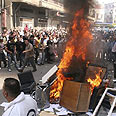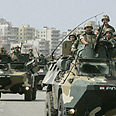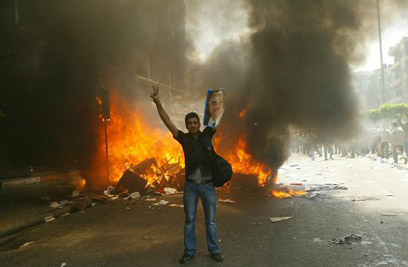

Fighting in northern Lebanon as Hizbullah ends Beirut takeover
Fierce battles between Sunni supporters of Western-backed government, members of Alawite sect loyal to Hizbullah rage in Tripoli as opposition says it is ending its takeover of west of capital. Official says thousands fleeing, several people wounded
Fierce battles raged in northern Lebanon on Sunday between rival clans as the Hizbullah-led opposition said it was ending its takeover of west Beirut.
A security official said the fighting in the north was between Sunni supporters of the Western-backed government and members of an Alawite sect loyal to Hizbullah. He added that thousands were fleeing and a number of people had been wounded.
The battles, which erupted overnight, were concentrated in the Bab al-Tebbaneh, Kobbeh and Jabal Mohsen neighborhoods located on the northern edge of the coastal city.
"About 7,000 people have fled from Bab al-Tebbaneh, which marks the frontlines, because of the battles," he said.
Residents of Tripoli could hear heavy machine gun firing and the thump of exploding rocket-propelled grenades, some of which fell inside the city, an AFP correspondent said.
Alawites are a secretive off-shoot of Shiite Islam who reveres Ali, the cousin and son-in-law of Prophet Muhammed.
The unrest came despite a return to calm in the capital Beirut on Saturday, which was the scene of fierce sectarian fighting between mainly Sunni supporters of the ruling bloc and Shiite militants from the opposition.
The opposition announced that it was ending its takeover of large swaths of west Beirut after the army revoked government moves against the Shiite group that sparked days of deadly fighting.
"The opposition welcomes the army's decision and will proceed with the withdrawal of all its armed elements so that control of the capital is handed over to the military," an opposition statement said.
Hizbullah's military might
The announcement came shortly after the army said it was overturning a government decision to reassign the head of Beirut airport security and to probe a communications network set up by Hizbullah.
But lawmaker Ali Hassan Khalil of Hizbullah's Shiite ally Amal said the opposition would maintain a civil disobedience campaign against the government.
Amal militants were among the first to pull back from the streets of west Beirut after four days of bitter clashes that left at least 34 people dead nationwide and brought the country dangerously close to a new civil war.
The White House welcomed Saturday's lessening of violence in Lebanon but warned that "our concerns regarding Hizbullah are unchanged."
"They continue to be a destabilising force there with the backing of their supporters, Iran and Syria," US National Security Council spokesman Gordon Johndroe said.
The takeover of west Beirut was a dramatic display of Hizbullah's military might and capacity to impose its will.
The army urged all armed militants off the streets in a bid to end the violence which also forced the closure of Lebanon's only civilian airport and Beirut port.
"The army command calls on all parties to (help restore calm) by ending armed protests and withdrawing gunmen from the streets and opening the roads," a statement said.
It said that the airport security chief would remain in his post pending an investigation and that it would examine the Hizbullah's communications network.
"Brigadier General Wafiq Shqeir will remain in his post until appropriate procedural measures have been taken after a probe," the statement said.
"As for the telecommunications network, the army will look into the issue in a manner that is not harmful to the public interest or the security of the resistance" against Israel, it added.

Streets on fire (Photo: AFP)
The military acted after Siniora made a televised address to the nation in which he accused Hizbullah of staging an armed coup but also urged the army to restore order.
In his first public reaction to Hizbullah's takeover of west Beirut, Siniora decried what he called a "poisonous sting" to democracy.
He said Hizbullah's weapons could no longer be considered to be legitimately held because they had been turned on the Lebanese themselves.
30 people killed
Sixteen people were killed in Saturday's violence, two of them at a funeral procession for an earlier victim of the sectarian fighting.
Fourteen people were also killed in north Lebanon in clashes between rival supporters, a security official told AFP.
An uneasy calm had settled over most of west Beirut earlier as people ventured out in the affected areas and cleaning crews swept away the debris.
The main road to the airport remained blocked for a fifth straight day Saturday and there were no incoming or outgoing flights.
Foreigners continued to leave Lebanon by road to Syria.
The unrest led to urgent international appeals for calm and Arab foreign ministers were due to hold an emergency meeting on the crisis on Sunday, amid fears among Sunni governments of an increase in the influence in Lebanon of Shiite Iran.
Washington on Friday pointed the finger at Iran and Syria for the violence, saying they must be held to account.
"The United States is consulting with other governments in the region and with the UN Security Council about measures that must be taken to hold those responsible for the violence in Beirut accountable," the White House said.
Lebanon's long-running political standoff, which first erupted in November 2006 when six pro-Syrian ministers quit the cabinet, has left it without a president since November, when Damascus protege Emile Lahoud's term ended.
The crippling political divide is widely seen as an extension of the confrontation pitting the United States and its Arab allies against Syria and Iran.















